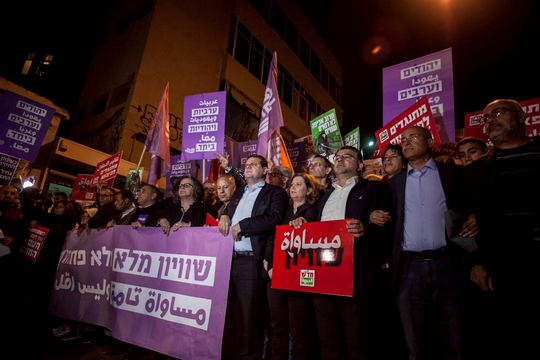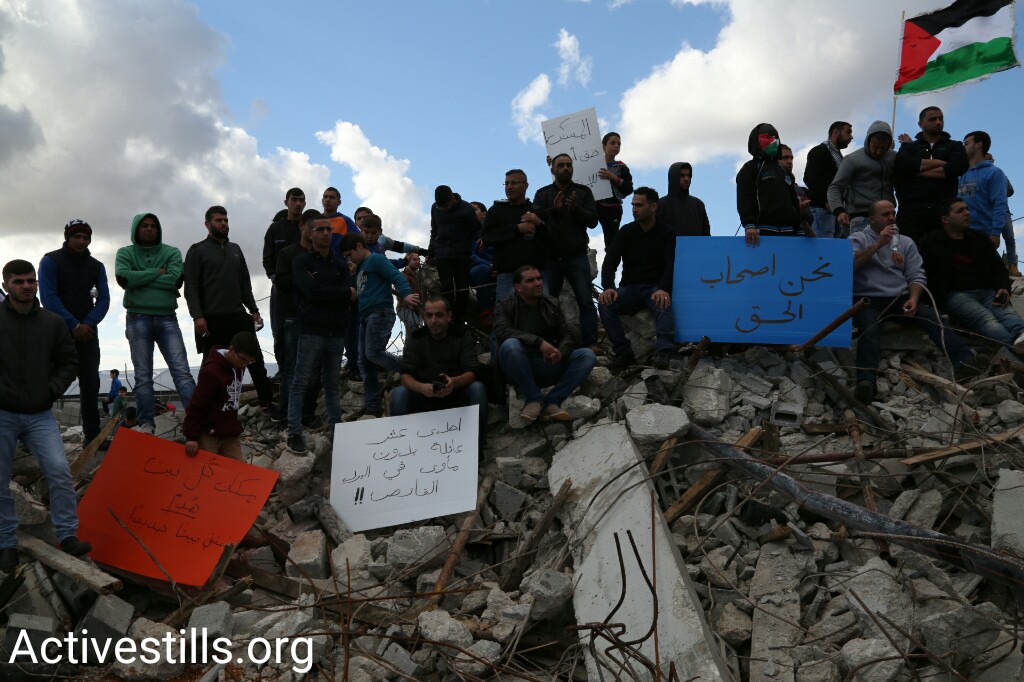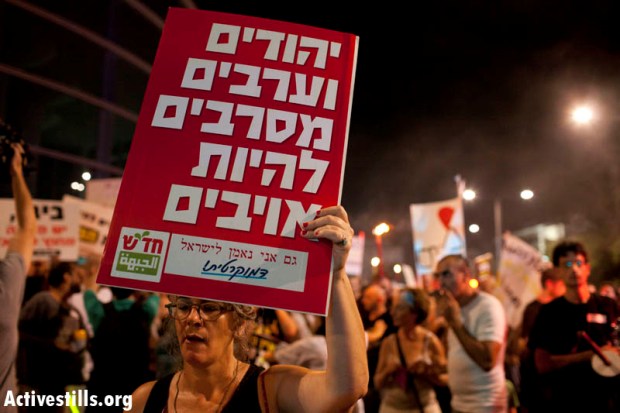The fact that the occupier declares his refusal to be ‘the enemy’ of the oppressed is simply not enough. Israelis must go one step further and refuse to lord over Palestinians.

A few hours before Saturday evening’s Arab-Jewish protest in Tel Aviv, the town of Qalansuwa held a conference to mark the international day of solidarity with Palestinians in Israel. Yes, there is such a thing. This is the second year in a row that we mark this day, with events taking place in Gaza, Ramallah, and Beirut.
I had the honor of speaking at the conference on Saturday, and as far as I could tell I was the only Jewish person in the room. The event ended early enough for me to head to the march in Tel Aviv. Yet somehow at the end of the event, the protest seemed less relevant. Qalansuwa is less than an hour from Tel Aviv, yet it exists in what feels like a parallel universe. It seems to me that we needed to invest a bit more energy in learning about this universe before we celebrate on the streets of Tel Aviv.
Don’t get me wrong — these days every act of joint Arab-Jewish resistance is praiseworthy. But one can also wonder how it is that we always play the role of the “host?” Why do these acts of joint protest almost always take place in Tel Aviv, which gets to — once again — show the world how liberal it is, while Palestinians are forced to make yet another pilgrimage to the White City from across the country? One can also wonder about demonstrations where Hebrew is the dominant language, where Jews speak out against racism, home demolitions, police violence. Where they call for equality and refuse to be enemies.

Yet these are the same rallies where Jews refuse to openly say that the reality we see today is the logical conclusion of Zionism itself — not a detour. They cannot say that this is its natural course, and that there is no way to reach “equality” without building an alternative to Zionism. They dare not speak of a state for all its citizens.
A ‘holy symmetry’
I assume that much of this will sound like political purism that subverts honest attempts by well-meaning Jews and Arabs to create spaces for partnership, despite our inciting, dividing leadership, which seeks to set us against one another. This is not my intention. The organizers and participants are my allies and part of my political camp. But we must be able to have this discussion within our movement, where dominant voices often silence those who deserve to be heard.
Holding Jewish-Arab protests is an incredibly important thing in its own right, but the implied symmetry is problematic. One of the most prominent expressions of this imagined symmetry is, for instance, the flagship slogan of these protests: “Jews and Arabs refuse to be enemies.” On paper, there is no more fitting slogan, especially in these days when hatred and enmity are running wild. But this slogan also hides an asymmetry that we must be aware of. The fact that Arabs refuse to be enemies of their occupier and oppressor is worthy of our deepest appreciation. The fact that the occupier refuses to be the enemy of the oppressed is certainly not enough. Jews should not refuse to be the enemy — they should refuse to be masters.

Among the thousands of participants in Saturday’s demonstration were, I assume, many Jews who have no real problem with a regime that grants them privileges at the expense of non-Jews, yet feel compelled to make clear that they “refuse to be enemies.” Perhaps it is the nature of these slogans to all-encompassing so that they include as many people as possible.
But we must also ask whether the number of attendants alone is enough to measure the success of a protest, and we are allowed to ask what kind of change a demonstration is trying to bring about when it refrains from slogans that actually touch on the root of the problem. And the root of the problem is not that Jews and Arabs want to be enemies — it is that same regime of privileges that even good Jews — some of whom even spoke onstage Saturday night — refuse to let go of.
Looking for the blind spots
This thinking not only dictates the slogans we hear, but its list of speakers. It is no coincidence that the rally was supposed to include a representative of the Zionist Union. It is no coincidence that not a single member of the Balad faction was invited to speak, and won’t likely be invited to these kinds of demonstrations.
If all it takes to participate in the protest is the willingness to declare that we “refuse to be enemies,” it means we are including representatives of a party that has not yet decided whether it supports or opposes a law that could expel a Palestinian elected official from the Knesset — while leaving out that very same official. This kind of demonstration, for me at least, becomes less attractive, and not only because I am a member of Balad. This is not a question of political ego or petty rivalries. While I praise my organizer friends for the successful protest, I believe we must be aware of the blind spots that leave people out of our movement.
After a trip through the streets of Qalansuwa and an hours worth of doing my best to understand the speeches in Arabic — an experience that, unfortunately, Jewish activists do not partake in very often — my optimism slowly dissipated, and I returned home to Jerusalem. The traffic, as usual, was in the opposite direction.
This article was first published in Hebrew on Local Call. Read it here.

